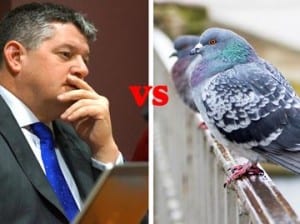
by Pigeon Patrol | Jan 24, 2016 | 4-S Gel Bird repellent, Bird Netting
 Pigeons never seem to crash. While their less-fortunate cousins occasionally take down airplanes, the humble city pigeon darts between lampposts, dodges skyscrapers and dips around oncoming traffic with ease. Now scientists have captured some of that action on film—and figured out how pigeons manage to squeeze through particularly tight spaces.
Pigeons never seem to crash. While their less-fortunate cousins occasionally take down airplanes, the humble city pigeon darts between lampposts, dodges skyscrapers and dips around oncoming traffic with ease. Now scientists have captured some of that action on film—and figured out how pigeons manage to squeeze through particularly tight spaces.
Pigeons need to strike the perfect balance between safe and efficient flight. When maneuvering between two poles, for instance, they can choose to either raise their wings upward in a mid-flap pause, or fold their wings inward. The so-called “wing-pause” is the more efficient method — it costs very little energy and results in almost no altitude loss. Meanwhile, the “wing-fold” position saps more energy and loses more altitude, but it’s easily the safest way to protect delicate wings from an unforgiving lamppost.
After training four pigeons to fly back and forth across a flight corridor, scientists dropped obstacles into their flight paths to test whether each bird would use the wing-pause or wing-fold maneuver. When it came to tight spaces, the scientists found that the birds favored the less efficient wing-fold maneuver — presumably because, in those situations, there was a high probability of ramming into a pole. But for larger gaps (12 inches, or about half a wingspan), the pigeons were less concerned about a collision, and chose the riskier but lower energy wing-pause maneuver. From the paper:
The choice between these two postures seems mediated by an element of caution or uncertainty…the efficient flight strategy is chosen where gaps are wider and there is less chance of a collision occurring.
The findings may explain why, despite the millions of pigeons in New York City, we rarely see them smash into cars or telephone poles. Beyond that the research suggests that some birds tune their flight strategies, rapidly weighing the odds of making it through a narrow pass.
About Pigeon Patrol:
Pigeon Patrol Products & Services is the leading manufacturer and distributor of bird deterrent (control) products in Canada. Pigeon Patrol products have solved pest bird problems in industrial, commercial, and residential settings since 2000, by using safe and humane bird deterrents with only bird and animal friendly solutions. At Pigeon Patrol, we manufacture and offer a variety of bird deterrents, ranging from Ultra-flex Bird Spikes with UV protection, Bird Netting, 4-S Gel and the best Ultrasonic and audible sound devices on the market today.
Voted Best Canadian wholesaler for Bird Deterrent products four years in a row.
Contact Info: 1- 877– 4– NO-BIRD (www.pigeonpatrol.ca)
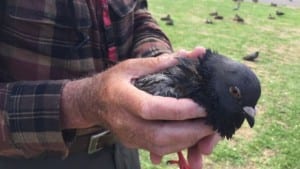
by Pigeon Patrol | Jan 20, 2016 | 4-S Gel Bird repellent, Bird Netting, Pigeon Patrol's Services
 A pest control contractor hired by Halifax has been using poison to control the pigeon population at the Keshen Goodman Public Library.
A pest control contractor hired by Halifax has been using poison to control the pigeon population at the Keshen Goodman Public Library.
CBC News uncovered the information when the city’s pest control contract came up for renewal. The new tender for services in Halifax includes a mention of “an Avitrol program” at the library.
Avitrol is described by its manufacturer as a flock deterrent. It’s designed to look like corn kernels and left out for birds to eat.
Once it’s consumed, Avitrol affects the birds’ central nervous system and causes convulsions that can last more than four hours. The prolonged, uncontrolled flapping is meant to scare other birds away.
The company’s website states there is no way to effectively use Avitrol without some birds dying from the product.
Hope Swinimer, founder of Hope for Wildlife, says she’s seen a number of poisoned birds brought to her shelter.
“It looks like they are struggling, just like mini seizures,” she said. “They look really confused and there’s sometimes vomiting too.”
Avitrol is currently banned in New York City, San Francisco, the United Kingdom and Red Deer, Alta.
Visitors to the Keshen Goodman Library were surprised to hear the poison has been used to control birds in the area.
“I think placing poison for that is not a good idea,” said Brenda Gionet.
“Sometimes my kids fall down and they put their hands on ground,” said Herman Bhuller.
Poison may not be effective
“If there’s poison on the ground and if they swallow it, I think that would be dangerous.”
The poison may not even be very effective. Many wildlife experts said new birds often move into the area once the previous birds are killed or scared off.
“If you revisit the spot, six months down the road, you’re going to see the exact same problem,” said Swinimer.
After CBC News contacted the city with questions about Avitrol, officials said the poison would no longer be specifically mentioned in the next tender for pest control, up for renewal this year.
However, there is no ban preventing Halifax’s contractor or other pest control companies from continuing to use Avitrol on public or private property.
About Pigeon Patrol:
Pigeon Patrol Products & Services is the leading manufacturer and distributor of bird deterrent (control) products in Canada. Pigeon Patrol products have solved pest bird problems in industrial, commercial, and residential settings since 2000, by using safe and humane bird deterrents with only bird and animal friendly solutions. At Pigeon Patrol, we manufacture and offer a variety of bird deterrents, ranging from Ultra-flex Bird Spikes with UV protection, Bird Netting, 4-S Gel and the best Ultrasonic and audible sound devices on the market today.
Voted Best Canadian wholesaler for Bird Deterrent products four years in a row.
Contact Info: 1- 877– 4– NO-BIRD (www.pigeonpatrol.ca)
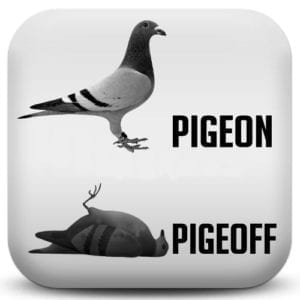
by Pigeon Patrol | Jan 17, 2016 | 4-S Gel Bird repellent, Bird Deterrent Products, Bird Netting
 It has come to my attention that there’s been some mirth at Hollister City Hall’s expense over the current field experiment with stereophonic raptor cackles in the downtown area. A steady stream of screeches and cackles emanates from the parking garage at Fourth and San Benito streets throughout the daylight hours.
It has come to my attention that there’s been some mirth at Hollister City Hall’s expense over the current field experiment with stereophonic raptor cackles in the downtown area. A steady stream of screeches and cackles emanates from the parking garage at Fourth and San Benito streets throughout the daylight hours.
I’m here to say that the mirth may be misplaced – at least for the time being. City Manager Bill Avera ordered the audio assault to be initiated in an effort to displace a booming population of feral pigeons that were busy procreating and simultaneously turning the garage into a cesspool.
Initial reports delivered to the City Council indicated that there do seem to be fewer pigeons doing what pigeons do in and on the garage structure. That makes sense. Birds are highly vocal, and critically aware of the noises around them. Broadcasting a variety of calls from predatory birds is likely to make other birds a little edgy and inclined to move on to quieter perches.
Birds use vocalizations for a number of purposes. Some of the singing we hear comes from males, eager to let others’ know that they’ve laid claim to a very desirable patch of real estate. Others are contact calls. Take a walk outside, and you are likely to encounter a cloud of Bushtits, or a flock of Chestnut-backed Chickadees, all visiting non-stop as they move through shrubs and trees. They’re staying in touch with one another, offering assurance that none of the members of the flock has seen or sensed anything thought to be a threat.
A group of retiring waterbirds called rails are very vocal. Given that they inhabit dense wetland growth, voice is just about the only way they can keep in touch with one another.
I may have been one of the first to notice the downtown calls, and to notice that they weren’t live, but Memorex. So let me be among the first to say that whatever efficacy the recordings have in convincing, the solution will be temporary at best.
Years ago, Bill Muenzer, owner of Muenzer’s Cyclery and Sporting Goods on Fifth Street, began selling life-sized plastic Great Horned Owls. They began appearing on downtown rooftops with the intention of moving the pigeons along. And that, too, seemed to work very well for a while.
But eventually, a thought flickered into some brighter-than-average pigeon pea brain. If those owls don’t move for a few weeks, maybe something’s up. Soon enough, the pigeons were back.
That’s going to happen with the recordings, too. So the feathered arms race will have to continue. A few years ago, the most chilling screams came from speakers on the roof of the Monterey Bay Aquarium Research Institute administrative building in Moss Landing. They were the sounds of gulls being seriously messed with. The calls made my blood run cold, but they didn’t seem to bother the hundreds of gulls perched on the same roof at all.
Some birds are well poised to thrive around people. Gulls can scavenge our leftovers and use flat rooftops as secure roosts. The feral pigeons circling downtown Hollister are the descendants of a genuine wild bird, known as the Rock Pigeon.
When Europeans first got here, the pigeons nested on cliff ledges. Then we built urban canyons filled with perfect cliff ledges. We call them “buildings” and “parking structures.”
Moreover, we continued domesticating pigeons. One of the first things a farmer does in domesticating livestock is to breed in a tendency to breed rapidly, the better to get more livestock.
The result is that today, we have a bunch of randy birds downtown with poor hygiene practices.
So enjoy the raucous downtown symphony while it lasts, because it won’t last long. The pigeons will see to it.
About Pigeon Patrol:
Pigeon Patrol Products & Services is the leading manufacturer and distributor of bird deterrent (control) products in Canada. Pigeon Patrol products have solved pest bird problems in industrial, commercial, and residential settings since 2000, by using safe and humane bird deterrents with only bird and animal friendly solutions. At Pigeon Patrol, we manufacture and offer a variety of bird deterrents, ranging from Ultra-flex Bird Spikes with UV protection, Bird Netting, 4-S Gel and the best Ultrasonic and audible sound devices on the market today.
Voted Best Canadian wholesaler for Bird Deterrent products four years in a row.
Contact Info: 1- 877– 4– NO-BIRD (www.pigeonpatrol.ca)
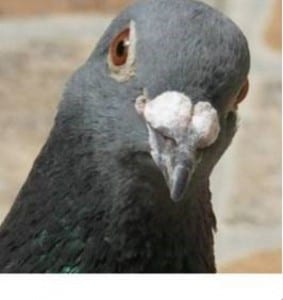
by Pigeon Patrol | Jan 15, 2016 | 4-S Gel Bird repellent, Animal Deterrent Products, Bird Deterrent Products, Bird Netting
 A chronically ill man may have to stop feeding his beloved pigeons, after a dispute with the manager of the supermarket next to his Bexleyheath flat.
A chronically ill man may have to stop feeding his beloved pigeons, after a dispute with the manager of the supermarket next to his Bexleyheath flat.
Steven Picard feeds stray birds on his roof – which overlooks the Sainsbury’s Local car park in Windermere Road – two to three times a day.
The 63-year-old supermarket “regular” has been told to stop encouraging the feathered creatures, and may now have to choose between them and his local store.
Following a dispute with store’s manager, Mr Picard was “peed off” and says the situation forced him to shop online for over a week.
He suffers from multiple sclerosis (MS), which means he struggles to travel further afield to shop.
He told News Shopper: “I think it’s ridiculous.
“It’s not illegal to feed pigeons.
“The supermarket’s only 50 yards away from me.
“It’s very inconvenient because of my MS to go any further.”
Mr Picard said the Sainsbury’s manager claimed birds were dive bombing customers and making a mess on cars, but Mr Picard refused to stop feeding them.
He added: “I do enjoy feeding them, because my lifestyle these days is quite limited.
“They congregate on my lower roof and then they go away.
“They know me well.
“It’s not in their area that I am feeding birds.
Feeding pigeons can attract large groups (stock image)
“I have been a good customer, every day for the last four years.”
Mr Picard was also upset and embarrassed that the manager “shouted at” him in front of other shoppers.
He said: “It was completely out of order.
“I cannot walk very easily because of my MS.
“I have to go online now for shopping.
“It’s a lot more inconvenient.
“I just want the situation to be resolved.”
About Pigeon Patrol:
Pigeon Patrol Products & Services is the leading manufacturer and distributor of bird deterrent (control) products in Canada. Pigeon Patrol products have solved pest bird problems in industrial, commercial, and residential settings since 2000, by using safe and humane bird deterrents with only bird and animal friendly solutions. At Pigeon Patrol, we manufacture and offer a variety of bird deterrents, ranging from Ultra-flex Bird Spikes with UV protection, Bird Netting, 4-S Gel and the best Ultrasonic and audible sound devices on the market today.
Voted Best Canadian wholesaler for Bird Deterrent products four years in a row.
Contact Info: 1- 877– 4– NO-BIRD (www.pigeonpatrol.ca)
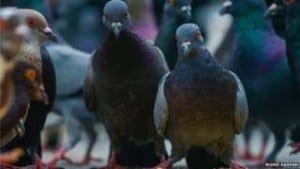
by Pigeon Patrol | Jan 13, 2016 | 4-S Gel Bird repellent, Bird Deterrent Products, Bird Netting, Pigeon Patrol's Services
 ABERDEEN, SD – We’ve all seen them. Some of us have maybe even cleaned up messes left by them.
ABERDEEN, SD – We’ve all seen them. Some of us have maybe even cleaned up messes left by them.
Cities across the country and here in KELOLAND are looking at ways to fight a pigeon problem. The issue made its way to the Aberdeen City Council Monday.
“They continue to be a continuous problem and they do cause quite a bit of damage and they’re a health hazard,” animal control officer John Weaver said.
Aberdeen city manager Lynn Lander wants to contract with a professional to fight the problem. Lander says the goal isn’t to eliminate the birds, but rather to control the population.
The service would cost $7,250 a year, Lander said. Owners would still need to play a part in guarding their property from pigeon damage.
“We would go to specific buildings to disrupt the nesting process because a typical pair can have as many as 20 offspring and a wild pigeon can live up to 10 years,” Lander said.
Pigeons have caused damage to public and private property in Aberdeen. The Aberdeen Police Department has a device that runs to a vent on the roof. Pigeons nested in that vent, dropping eggs and droppings right down into the building.
“Very annoying,” Daryl Van Dover with the Aberdeen Police Department said. “The pigeons have been quite a problem for some time.”
“Through my research and talking to various different municipalities, we all have the same problems,” Lander said.
There are already efforts underway to cut down on the number of pigeons in town. The Aberdeen Downtown Association manages a netting program. Through that program a man recently captured and hauled more than 500 birds from the Hub City, Weaver said.
Lander wants the additional pigeon population control to target problem areas and supplement efforts already taking place.
At the police station, workers have already tried blocking birds from the vent but say they’re running into issues again.
“We’re attempting to screen them out once again and hopefully that’ll take care of the problem,” Weaver said.
About Pigeon Patrol:
Pigeon Patrol Products & Services is the leading manufacturer and distributor of bird deterrent (control) products in Canada. Pigeon Patrol products have solved pest bird problems in industrial, commercial, and residential settings since 2000, by using safe and humane bird deterrents with only bird and animal friendly solutions. At Pigeon Patrol, we manufacture and offer a variety of bird deterrents, ranging from Ultra-flex Bird Spikes with UV protection, Bird Netting, 4-S Gel and the best Ultrasonic and audible sound devices on the market today.
Voted Best Canadian wholesaler for Bird Deterrent products four years in a row.
Contact Info: 1- 877– 4– NO-BIRD (www.pigeonpatrol.ca)
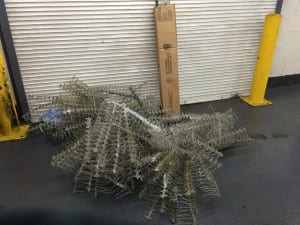
by Pigeon Patrol | Jan 10, 2016 | 4-S Gel Bird repellent, Bird Deterrent Products, Bird Netting, UltraSonic Bird Control
 DUBAI, United Arab Emirates—In 2010, an English-language newspaper in Dubai ran a cover story titled Pigeon Impossible: Rats With Wings. “Pigeons have become a nuisance in the city, leaving many residents exasperated,” the report said. “These birds which have been breeding uncontrollably are messing up property with their droppings.” It detailed how pigeon waste was corroding roofs, windows, machinery, car paint, and infecting air conditioning systems. A public health official lamented the “serious” problem, but said that there was no way to count the number of pigeons that were relieving themselves across the city.
DUBAI, United Arab Emirates—In 2010, an English-language newspaper in Dubai ran a cover story titled Pigeon Impossible: Rats With Wings. “Pigeons have become a nuisance in the city, leaving many residents exasperated,” the report said. “These birds which have been breeding uncontrollably are messing up property with their droppings.” It detailed how pigeon waste was corroding roofs, windows, machinery, car paint, and infecting air conditioning systems. A public health official lamented the “serious” problem, but said that there was no way to count the number of pigeons that were relieving themselves across the city.
The report pointed out that Switzerland had experimented with pigeon contraceptive pills, Britain had hired air gun–wielding snipers to shoot pigeons off buildings, and the United States had used plastic models of birds of prey to scare them off airport runways.
Dubai has been called “the Manhattan of the Arab world.” Over the past three decades, as the United Arab Emirates rapidly developed, it had been preoccupied with breaking world records: It now has the world’s tallest building, largest mall, longest driverless metro, and fastest steel rollercoaster. But an onslaught of pigeon droppings didn’t fit the city’s glittering public image.
The city’s growth was accompanied by a growth in the pest population, including pigeons. A proliferation of pest control firms, now over a hundred in Dubai, was accompanied by a niche market specializing in bird control, many of them employing falcons—natural predators of smaller birds as well as a prized status symbol for the Emirati elite. At the upper end of the market, falcons now travel on private jets with royals from the Persian Gulf on hunting expeditions across the world. In 2010, the UAE led a submission to UNESCO, the United Nations’ cultural agency, eventually having falconry, a tradition dating back at least 4,000 years, recognized as an example of intangible cultural heritage. But thanks to the pigeon problem, falcons are being put to work in less glamorous occupations as well.
One morning in January, a flock of pigeons with bobbing heads, their rainbowlike neck feathers sparkling, occupied a railing on a sand-bleached luxury hotel. The hotel sits in a palm-tree–shaped artificial archipelago, the Palm Jumeirah, on the southern coast. The pigeons bumbled near the Gold Suites, rooms that came with gold furnishings, rain showers, and a private butler to pack bags and shine shoes.
A few weeks earlier, a family at a resort nearby had been attacked by crows, one of them digging its claws into a guest’s head, requiring first-aid with painkillers and icepacks.
“These feral birds,” said Hendri Du Toit, an urban falconer, squinting at the Gold Suites. “They won’t be here for long because Marley has come.”
Marley, a saker falcon with gold-flecked wings, was blindfolded and perched on Du Toit’s arm. He was born and bred in Dubai, even though saker falcons, recognized by their brown upperbellies and horizontal pursuit, usually breed around the northern Himalayas. Marley had traveled to this hotel sitting inside the boot of an SUV that barreled past skyscrapers with mirrored windows and marble megaliths. Another saker falcon, Ziggy (who is not Marley’s son), waited in the boot while Marley finished his assignment.
Du Toit, who grew up in South Africa, has been a full-time falconer in Dubai for three years, working for his mentor Peter Bergh, who runs a falconry firm specializing in bird control and entertainment shows.
Marley’s job was to scare, not kill, Du Toit said, attaching a transmitter to the falcon’s back to track his location. He had been trained to circle around, sending the pigeons fleeing in dust, dirt, panic, and then return to his falconer, who would reward him with a big feathery chunk of quail meat.
Du Toit lifted the leather hood that covered Marley’s eyes, and the bird looked around hysterically, his eyes shining like black marbles. On one side he saw a constellation of deck chairs, beach umbrellas, and a water-dipped skyline, and on the other, a row of great buildings, facades, and railings where pigeons, crows, and Indian mynas could be hiding.
He settled on top of a white beach umbrella.
“He’s lazy today because there isn’t a lot of wind,” Du Toit said. “So we’ll let him follow us around for a bit.”
Du Toit walked along the beachfront, a piece of quail tucked into his pocket, and Marley hopped closer, one umbrella to the next.
“Why is he following this silly man?” Du Toit said. “Because he knows I have his lunch.”
Marley finally took off, heading for the Gold Suites, sending the flock of pigeons into delirium. He knew the area well, Du Toit said, because he’d been flying here three times a week for two years as part of the falconry firm’s winter team. The summer team was currently in the molting chambers, changing feathers under artificial light, to get ready for bird control during the summer. (Molt is triggered by longer daylight hours, when the bird perceives food to be in abundance and invests in feather growth. To avoid featherless falcons being scorched in the testing Dubai summer, molting was being artificially stimulated in advance.)
Marley had never killed a pigeon during his pest-control rounds because then “the pigeon family will know it’s safe for the next day or two,” Du Toit said. “We don’t want that.”
The hotel kept a monthly record of the number of complaints from pigeons. A drop in complaining guests meant Marley was doing well, and an increase (which usually came in winter when guests preferred to dine outdoors) meant he needed to expand his route and flying time.
Du Toit kneeled and swirled a rope with a piece of quail tied to one end, and Marley dived for it. He was back on his falconer’s arm, being fed, hooded, and sent to his “happy place,” in Du Toit’s words.
On Fridays, Marley’s duties extended to posing for photos with hotel guests who were looking for a new display picture. “He doesn’t mind being around people,” Du Toit said. “But at the end of the day, he’s a hunting companion and not a pet.”
Bergh, the man Du Toit reports to at Royal Shaheen, the falconry firm, started his business eight years ago with two birds. “Today we have 11 guys and 85 birds,” he said. “Because falconry is one of those things that is like a disease. It kind of grabs you from the inside and doesn’t let you go.”
If you break down Bergh’s features into slight eyes, wide smile, sunburnt nose, it does not capture the boyhood wonder with which he recounts every experience.
“Flying falcons in the middle of a concrete jungle is hardcore. It’s a really tough form of falconry,” he said. “The birds come back because I’m their food provider, they don’t come because they like me or think I’m a nice guy. They’re creatures of habit. So they’re thinking, ‘If I come back to Pete, I get a big fat juicy meal but if I catch a pigeon, I get one small juicy meal.’ ”
Falconry essentially is the art of managing a falcon’s appetite, he said. “You’re standing here on the beach, when the falcon starts disappearing around the back of the hotel, you’ve now lost visual contact, your communication is gone, your mobile signal is gone. If the bird now sees a pigeon across the road, what’s stopping the bird from deciding to chase that pigeon? Nothing really, other than the bird’s loyalty to fly around the building and seek comfort in seeing Pete again. In an urban environment, the margin for error is huge, you’re radically increasing the possibility of something going wrong.”
Bergh, 36, grew up on a sugarcane farm in Pietermaritzburg, a small town outside Durban in South Africa, studying until the 10th grade and taking care of his parent’s horses. At 17, he became a professional player of polocrosse (a sport that marries polo and lacrosse), first representing his country and then playing for a rich coffee farmer’s team in Zimbabwe. Five years later, he came to Dubai to become a guide at a desert resort that kept horses, camels, and falcons.
“It fascinated me that the falcon would go and kill something, you could make a trade and put the whole kill in your pocket, and it would take a little reward to do it again,” he said. “I read all the books there were to read and I spent every spare minute I had at the mews,” a place where falcons are kept.
He then trained under a falconer in Dubai whose main business was bird control, and after two years, he quit to set up his own business, partnering with a falcon breeder who had the patronage of a sheikh from Dubai’s ruling family. The breeder would lend his birds, which cost anything from $1,500 to a million. The price of a falcon is determined by bloodline, breed, size, and gender. The most sought-after is the female gyrfalcon, larger by almost a third compared to the male, and originating from the Arctic.
“Contrary to popular belief, there is no such thing as an Arabian falcon. They don’t come from here, it’s too hot,” he said. “It was when they would migrate over the Middle East on their way to Africa that the Bedouin learned to catch their falcons and train them. At the end of winter, they would simply untie them and release them back to the wild. A beautiful system, hey?”
Bergh spends his spare mornings innovating for tourism shows, where the majesty of the falcon can be fully displayed. “I’m trying to push a lot of my attention on the tourism stuff. We can keep doing bird control but we know that Dubai wants to go for Expo 2020, we know how many people are coming to the Dubai airport, and that there’s a huge market for this,” he said.
One of his ideas is to get his falcons to chase a radio-controlled plane that he modified to resemble a houbara bustard, the bird traditionally hunted by the Bedouin, and now pushed to near extinction, prompting governments to cancel hunting permits to Arab royalty.
One morning in March, Bergh was lying flat, his chin buried in sand, in the middle of the 87–square-mile Dubai Desert Conservation Reserve, talking to a black peregrine falcon. He was gently pulling a rope with a piece of quail attached at one end, the falcon first fluttering in defiance, but then hopping along obediently as his bait moved closer.
Three other falcons—Darky, Thunder, and Batman—had been lined up on a metal stand covered with artificial grass. Bergh wielded his kite-shaped toy plane, parts of it glued to an enlarged image of the flaky pattern found on the houbara bustard’s wings. He attached a piece of quail to the plane with a magnet, and Thunder, a peregrine who had now been unhooded, flapped her wings. The plane took off, Bergh maneuvering its movements with a remote, and Thunder leaped in pursuit. The two disappeared into the sky until Thunder finally snatched her lure midair, and the plane dipped.
“She got clever,” Bergh said, sipping his morning coffee. “We need to maneuver more next time.” So far, Bergh has crashed 38 toy planes.
Three other white SUVs pulled over in the desert plateau with falconers who were training a sheikh’s birds with a live pigeon. Bergh waved at them, and they waved back.
Bergh began experimenting with remote-control planes after he watched a sheikh’s falconers use drones to develop a falcon’s muscles. “The way the Arab have traditionally hunted is like here I’m on a camel with my falcon who is wearing his burqa. When they find a hobuara, the hood comes off, and it’s a straight-line sprint. Catch the houbara, put in my pocket, feed my family, and let’s go again,” he said. “We need to understand how dialed-in the Bedouin were to the land. Now imagine what they could have done with technology.”
About Pigeon Patrol:
Pigeon Patrol Products & Services is the leading manufacturer and distributor of bird deterrent (control) products in Canada. Pigeon Patrol products have solved pest bird problems in industrial, commercial, and residential settings since 2000, by using safe and humane bird deterrents with only bird and animal friendly solutions. At Pigeon Patrol, we manufacture and offer a variety of bird deterrents, ranging from Ultra-flex Bird Spikes with UV protection, Bird Netting, 4-S Gel and the best Ultrasonic and audible sound devices on the market today.
Voted Best Canadian wholesaler for Bird Deterrent products four years in a row.
Contact Info: 1- 877– 4– NO-BIRD (www.pigeonpatrol.ca)

 Pigeons never seem to crash. While their less-fortunate cousins occasionally take down airplanes, the humble city pigeon darts between lampposts, dodges skyscrapers and dips around oncoming traffic with ease. Now scientists have captured some of that action on film—and figured out how pigeons manage to squeeze through particularly tight spaces.
Pigeons never seem to crash. While their less-fortunate cousins occasionally take down airplanes, the humble city pigeon darts between lampposts, dodges skyscrapers and dips around oncoming traffic with ease. Now scientists have captured some of that action on film—and figured out how pigeons manage to squeeze through particularly tight spaces.

 A pest control contractor hired by Halifax has been using poison to control the pigeon population at the Keshen Goodman Public Library.
A pest control contractor hired by Halifax has been using poison to control the pigeon population at the Keshen Goodman Public Library.
 It has come to my attention that there’s been some mirth at Hollister City Hall’s expense over the current field experiment with stereophonic raptor cackles in the downtown area. A steady stream of screeches and cackles emanates from the parking garage at Fourth and San Benito streets throughout the daylight hours.
It has come to my attention that there’s been some mirth at Hollister City Hall’s expense over the current field experiment with stereophonic raptor cackles in the downtown area. A steady stream of screeches and cackles emanates from the parking garage at Fourth and San Benito streets throughout the daylight hours.
 A chronically ill man may have to stop feeding his beloved pigeons, after a dispute with the manager of the supermarket next to his Bexleyheath flat.
A chronically ill man may have to stop feeding his beloved pigeons, after a dispute with the manager of the supermarket next to his Bexleyheath flat.
 ABERDEEN, SD – We’ve all seen them. Some of us have maybe even cleaned up messes left by them.
ABERDEEN, SD – We’ve all seen them. Some of us have maybe even cleaned up messes left by them.
 DUBAI, United Arab Emirates—In 2010, an English-language newspaper in Dubai ran a cover story titled Pigeon Impossible: Rats With Wings. “Pigeons have become a nuisance in the city, leaving many residents exasperated,” the report said. “These birds which have been breeding uncontrollably are messing up property with their droppings.” It detailed how pigeon waste was corroding roofs, windows, machinery, car paint, and infecting air conditioning systems. A public health official lamented the “serious” problem, but said that there was no way to count the number of pigeons that were relieving themselves across the city.
DUBAI, United Arab Emirates—In 2010, an English-language newspaper in Dubai ran a cover story titled Pigeon Impossible: Rats With Wings. “Pigeons have become a nuisance in the city, leaving many residents exasperated,” the report said. “These birds which have been breeding uncontrollably are messing up property with their droppings.” It detailed how pigeon waste was corroding roofs, windows, machinery, car paint, and infecting air conditioning systems. A public health official lamented the “serious” problem, but said that there was no way to count the number of pigeons that were relieving themselves across the city.